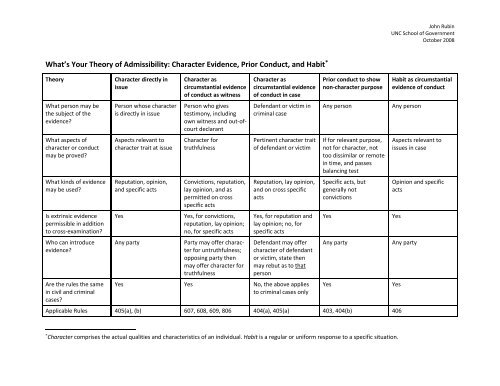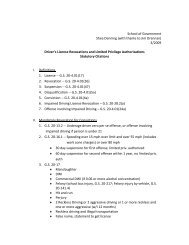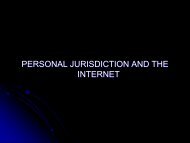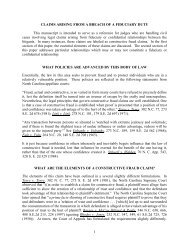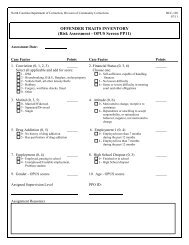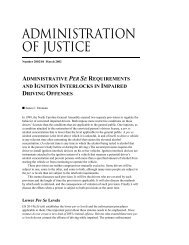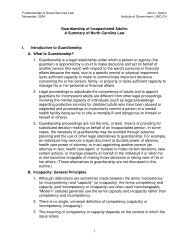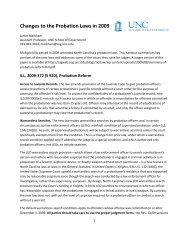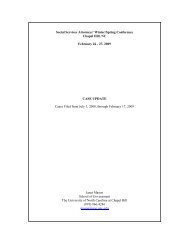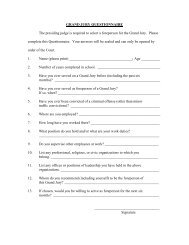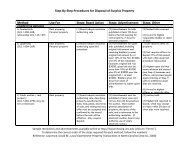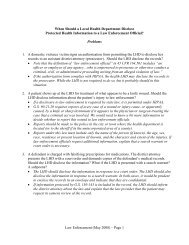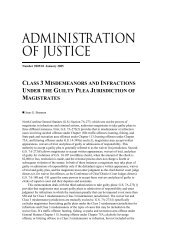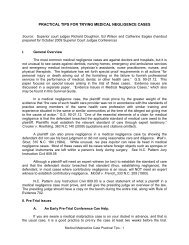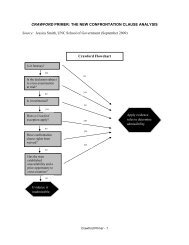What's Your Theory of Admissibility: Character Evidence, Prior ...
What's Your Theory of Admissibility: Character Evidence, Prior ...
What's Your Theory of Admissibility: Character Evidence, Prior ...
You also want an ePaper? Increase the reach of your titles
YUMPU automatically turns print PDFs into web optimized ePapers that Google loves.
What’s <strong>Your</strong> <strong>Theory</strong> <strong>of</strong> <strong>Admissibility</strong>: <strong>Character</strong> <strong>Evidence</strong>, <strong>Prior</strong> Conduct, and Habit ∗<br />
<strong>Theory</strong> <strong>Character</strong> directly in<br />
issue<br />
What person may be<br />
the subject <strong>of</strong> the<br />
evidence?<br />
What aspects <strong>of</strong><br />
character or conduct<br />
may be proved?<br />
What kinds <strong>of</strong> evidence<br />
may be used?<br />
Is extrinsic evidence<br />
permissible in addition<br />
to cross‐examination?<br />
Who can introduce<br />
evidence?<br />
Are the rules the same<br />
in civil and criminal<br />
cases?<br />
Person whose character<br />
is directly in issue<br />
Aspects relevant to<br />
character trait at issue<br />
Reputation, opinion,<br />
and specific acts<br />
<strong>Character</strong> as<br />
circumstantial evidence<br />
<strong>of</strong> conduct as witness<br />
Person who gives<br />
testimony, including<br />
own witness and out‐<strong>of</strong>‐<br />
court declarant<br />
<strong>Character</strong> for<br />
truthfulness<br />
Convictions, reputation,<br />
lay opinion, and as<br />
permitted on cross<br />
specific acts<br />
Yes Yes, for convictions,<br />
reputation, lay opinion;<br />
no, for specific acts<br />
Any party Party may <strong>of</strong>fer charac‐<br />
ter for untruthfulness;<br />
opposing party then<br />
may <strong>of</strong>fer character for<br />
truthfulness<br />
<strong>Character</strong> as<br />
circumstantial evidence<br />
<strong>of</strong> conduct in case<br />
Defendant or victim in<br />
criminal case<br />
Pertinent character trait<br />
<strong>of</strong> defendant or victim<br />
Reputation, lay opinion,<br />
and on cross specific<br />
acts<br />
Yes, for reputation and<br />
lay opinion; no, for<br />
specific acts<br />
Defendant may <strong>of</strong>fer<br />
character <strong>of</strong> defendant<br />
or victim, state then<br />
may rebut as to that<br />
person<br />
Yes Yes No, the above applies<br />
to criminal cases only<br />
<strong>Prior</strong> conduct to show<br />
non‐character purpose<br />
Any person Any person<br />
If for relevant purpose,<br />
not for character, not<br />
too dissimilar or remote<br />
in time, and passes<br />
balancing test<br />
Specific acts, but<br />
generally not<br />
convictions<br />
Yes Yes<br />
John Rubin<br />
UNC School <strong>of</strong> Government<br />
October 2008<br />
Habit as circumstantial<br />
evidence <strong>of</strong> conduct<br />
Aspects relevant to<br />
issues in case<br />
Any party Any party<br />
Yes Yes<br />
Applicable Rules 405(a), (b) 607, 608, 609, 806 404(a), 405(a) 403, 404(b) 406<br />
∗ <strong>Character</strong> comprises the actual qualities and characteristics <strong>of</strong> an individual. Habit is a regular or uniform response to a specific situation.<br />
Opinion and specific<br />
acts
<strong>Evidence</strong> Rules on <strong>Character</strong>, Non-<strong>Character</strong> Purposes, and Habit<br />
Rule 403. Exclusion <strong>of</strong> relevant evidence on grounds <strong>of</strong> prejudice, confusion, or waste <strong>of</strong><br />
time.<br />
Although relevant, evidence may be excluded if its probative value is substantially<br />
outweighed by the danger <strong>of</strong> unfair prejudice, confusion <strong>of</strong> the issues, or misleading the jury, or<br />
by considerations <strong>of</strong> undue delay, waste <strong>of</strong> time, or needless presentation <strong>of</strong> cumulative<br />
evidence. (1983, c. 701, s. 1.)<br />
Rule 404. <strong>Character</strong> evidence not admissible to prove conduct; exceptions; other crimes.<br />
(a) <strong>Character</strong> evidence generally. – <strong>Evidence</strong> <strong>of</strong> a person's character or a trait <strong>of</strong> his<br />
character is not admissible for the purpose <strong>of</strong> proving that he acted in conformity therewith on a<br />
particular occasion, except:<br />
(1) <strong>Character</strong> <strong>of</strong> accused. – <strong>Evidence</strong> <strong>of</strong> a pertinent trait <strong>of</strong> his character <strong>of</strong>fered<br />
by an accused, or by the prosecution to rebut the same;<br />
(2) <strong>Character</strong> <strong>of</strong> victim. – <strong>Evidence</strong> <strong>of</strong> a pertinent trait <strong>of</strong> character <strong>of</strong> the victim<br />
<strong>of</strong> the crime <strong>of</strong>fered by an accused, or by the prosecution to rebut the same, or<br />
evidence <strong>of</strong> a character trait <strong>of</strong> peacefulness <strong>of</strong> the victim <strong>of</strong>fered by the<br />
prosecution in a homicide case to rebut evidence that the victim was the first<br />
aggressor;<br />
(3) <strong>Character</strong> <strong>of</strong> witness. – <strong>Evidence</strong> <strong>of</strong> the character <strong>of</strong> a witness, as provided in<br />
Rules 607, 608, and 609.<br />
(b) Other crimes, wrongs, or acts. – <strong>Evidence</strong> <strong>of</strong> other crimes, wrongs, or acts is not<br />
admissible to prove the character <strong>of</strong> a person in order to show that he acted in conformity<br />
therewith. It may, however, be admissible for other purposes, such as pro<strong>of</strong> <strong>of</strong> motive,<br />
opportunity, intent, preparation, plan, knowledge, identity, or absence <strong>of</strong> mistake, entrapment or<br />
accident. Admissible evidence may include evidence <strong>of</strong> an <strong>of</strong>fense committed by a juvenile if it<br />
would have been a Class A, B1, B2, C, D, or E felony if committed by an adult. (1983, c. 701, s.<br />
1; 1994, Ex. Sess., c. 7, s. 3; 1995, c. 509, s. 7.)<br />
Rule 405. Methods <strong>of</strong> proving character.<br />
(a) Reputation or opinion. – In all cases in which evidence <strong>of</strong> character or a trait <strong>of</strong><br />
character <strong>of</strong> a person is admissible, pro<strong>of</strong> may be made by testimony as to reputation or by<br />
testimony in the form <strong>of</strong> an opinion. On cross-examination, inquiry is allowable into relevant<br />
specific instances <strong>of</strong> conduct. Expert testimony on character or a trait <strong>of</strong> character is not<br />
admissible as circumstantial evidence <strong>of</strong> behavior.<br />
(b) Specific instances <strong>of</strong> conduct. – In cases in which character or a trait <strong>of</strong> character <strong>of</strong> a<br />
person is an essential element <strong>of</strong> a charge, claim, or defense, pro<strong>of</strong> may also be made <strong>of</strong> specific<br />
instances <strong>of</strong> his conduct. (1983, c. 701, s. 1.)<br />
Rule 406. Habit; routine practice.<br />
<strong>Evidence</strong> <strong>of</strong> the habit <strong>of</strong> a person or <strong>of</strong> the routine practice <strong>of</strong> an organization, whether<br />
corroborated or not and regardless <strong>of</strong> the presence <strong>of</strong> eyewitnesses, is relevant to prove that the<br />
conduct <strong>of</strong> the person or organization on a particular occasion was in conformity with the habit<br />
or routine practice. (1983, c. 701, s. 1.)<br />
2
Rule 607. Who may impeach.<br />
The credibility <strong>of</strong> a witness may be attacked by any party, including the party calling him.<br />
(1983, c. 701, s. 1.)<br />
Rule 608. <strong>Evidence</strong> <strong>of</strong> character and conduct <strong>of</strong> witness.<br />
(a) Opinion and reputation evidence <strong>of</strong> character. – The credibility <strong>of</strong> a witness may be<br />
attacked or supported by evidence in the form <strong>of</strong> reputation or opinion as provided in Rule<br />
405(a), but subject to these limitations: (1) the evidence may refer only to character for<br />
truthfulness or untruthfulness, and (2) evidence <strong>of</strong> truthful character is admissible only after the<br />
character <strong>of</strong> the witness for truthfulness has been attacked by opinion or reputation evidence or<br />
otherwise.<br />
(b) Specific instances <strong>of</strong> conduct. – Specific instances <strong>of</strong> the conduct <strong>of</strong> a witness, for the<br />
purpose <strong>of</strong> attacking or supporting his credibility, other than conviction <strong>of</strong> crime as provided in<br />
Rule 609, may not be proved by extrinsic evidence. They may, however, in the discretion <strong>of</strong> the<br />
court, if probative <strong>of</strong> truthfulness or untruthfulness, be inquired into on cross-examination <strong>of</strong> the<br />
witness (1) concerning his character for truthfulness or untruthfulness, or (2) concerning the<br />
character for truthfulness or untruthfulness <strong>of</strong> another witness as to which character the witness<br />
being cross-examined has testified.<br />
The giving <strong>of</strong> testimony, whether by an accused or by any other witness, does not operate as<br />
a waiver <strong>of</strong> his privilege against self-incrimination when examined with respect to matters which<br />
relate only to credibility. (1983, c. 701, s. 1.)<br />
Rule 609. Impeachment by evidence <strong>of</strong> conviction <strong>of</strong> crime.<br />
(a) General rule. – For the purpose <strong>of</strong> attacking the credibility <strong>of</strong> a witness, evidence that<br />
the witness has been convicted <strong>of</strong> a felony, or <strong>of</strong> a Class A1, Class 1, or Class 2 misdemeanor,<br />
shall be admitted if elicited from the witness or established by public record during<br />
cross-examination or thereafter.<br />
(b) Time limit. – <strong>Evidence</strong> <strong>of</strong> a conviction under this rule is not admissible if a period <strong>of</strong><br />
more than 10 years has elapsed since the date <strong>of</strong> the conviction or <strong>of</strong> the release <strong>of</strong> the witness<br />
from the confinement imposed for that conviction, whichever is the later date, unless the court<br />
determines, in the interests <strong>of</strong> justice, that the probative value <strong>of</strong> the conviction supported by<br />
specific facts and circumstances substantially outweighs its prejudicial effect. However, evidence<br />
<strong>of</strong> a conviction more than 10 years old as calculated herein is not admissible unless the<br />
proponent gives to the adverse party sufficient advance written notice <strong>of</strong> intent to use such<br />
evidence to provide the adverse party with a fair opportunity to contest the use <strong>of</strong> such evidence.<br />
(c) Effect <strong>of</strong> pardon. – <strong>Evidence</strong> <strong>of</strong> a conviction is not admissible under this rule if the<br />
conviction has been pardoned.<br />
(d) Juvenile adjudications. – <strong>Evidence</strong> <strong>of</strong> juvenile adjudications is generally not admissible<br />
under this rule. The court may, however, in a criminal case allow evidence <strong>of</strong> a juvenile<br />
adjudication <strong>of</strong> a witness other than the accused if conviction <strong>of</strong> the <strong>of</strong>fense would be admissible<br />
to attack the credibility <strong>of</strong> an adult and the court is satisfied that admission in evidence is<br />
necessary for a fair determination <strong>of</strong> the issue <strong>of</strong> guilt or innocence.<br />
(e) Pendency <strong>of</strong> appeal. – The pendency <strong>of</strong> an appeal therefrom does not render evidence<br />
<strong>of</strong> a conviction inadmissible. <strong>Evidence</strong> <strong>of</strong> the pendency <strong>of</strong> an appeal is admissible. (1983, c. 701,<br />
s. 1; 1999-79, s. 1.)<br />
3
Rule 806. Attacking and supporting credibility <strong>of</strong> declarant.<br />
When a hearsay statement has been admitted in evidence, the credibility <strong>of</strong> the declarant may<br />
be attacked, and if attacked may be supported, by any evidence which would be admissible for<br />
those purposes if declarant had testified as a witness. <strong>Evidence</strong> <strong>of</strong> a statement or conduct by the<br />
declarant at any time, inconsistent with his hearsay statement, is not subject to any requirement<br />
that he may have been afforded an opportunity to deny or explain. If the party against whom a<br />
hearsay statement has been admitted calls the declarant as a witness, the party is entitled to<br />
examine him on the statement as if under cross-examination. (1983, c. 701, s. 1.)<br />
4


